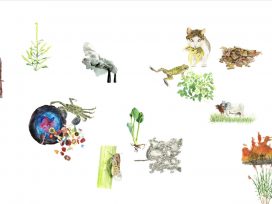At the beginning of the 1970s, Greenpeace was a motley band of peaceniks and environmentalists living in our home province of British Columbia in Canada. Now the Amsterdam headquarters of Greenpeace manages a multimillion-dollar brand, with scores of branches worldwide, thousands of employees and millions of financial supporters.

Corporatization is narrowing “the limits of the possible”, argue LeBaron and Dauvergne. Photo: vovan. Source: Shutterstock
The history of Greenpeace is one of courage and daring defiance, and the organization has long protested both unsustainable production and wasteful consumption. But like every multinational NGO, Greenpeace is under great pressure to achieve short-term results, which are now so essential for raising the money required to pay a burgeoning staff and finance projects.
In 2011, one of Greenpeace’s big “victories” was convincing Barbie-doll manufacturer Mattel to remove illegal rainforest wood from its cardboard-box packaging. This campaign certainly had its merits, and Greenpeace may think of it as a win. But it’s not. Praising Mattel and calling this a victory may enhance public trust in the Greenpeace brand, but it also legitimizes the trade and consumption that Greenpeace has long opposed, and which lie at the root of unsustainable patterns of growth and development.
All NGOs want to gain the public’s trust, and in recent years they have done well on that score. The 2014 Edelman Trust Barometer ranked NGOs as the world’s most trusted institution – the seventh year in a row that they have come out on top of business, media and governments.
Trusted brands like Amnesty International and WWF are now going toe-to-toe with Coke, McDonald’s and Nike. As Nathalie Laidler-Kylander, John Quelch, and Bernard Simonin point out, over the past decade, both Amnesty International and WWF have remained among Europe’s top five most trusted brands, with Amnesty at number one in 2004, beating out Microsoft and Michelin. That year Amnesty ranked thirteenth in the United States, just behind corporate brands such as UPS, Proctor & Gamble and Johnson & Johnson.
The brand value of some NGOs even rivals that of iconic businesses. In 2001, Interbrand already estimated that the brand value of Habitat for Humanity was 1.8 billion dollars – which at that time put it on a par with Starbucks. In the words of former Greenpeace communications director Jonathan Wootliff and PR executive Christopher Deri, NGOs have become “The new super brands”. Understandably, corporations are eager to partner with them. Doing so costs them relatively little, yet the payback can be substantial. It enhances their reputation for social responsibility, deflects their critics and helps to advertise their products.
Many NGOs are just as keen to partner with multinational corporations. Some merely want more money to pay staff and run bigger projects. But most enter the game of partnering in order to access corporate boardrooms. “We could spend 50 years lobbying 75 national governments”, the former president of WWF Canada remarked to journalist Simon Houpt in 2011, “or these folks at Coke could make a decision […] and the whole global supply chain changes overnight. And that in a nutshell is why we’re in a partnership.”
However, gaining access to the boardroom and taking corporate money comes with a price. As we explore in our new book Protest Inc., activist and advocacy organizations have increasingly come to look and act an awful lot like multinational corporations. Just like corporations, high-powered lawyers and marketing consultants now serve and defend the leading brands of NGOs. WWF has successfully sued the World Wrestling Federation for using the acronym “WWF”, forcing the Federation to change its name. And Amnesty hired GlobeScan – a marketing firm whose clients include Barrick Gold, BP, Chevron, Shell and Goldman Sachs – “to build a revitalized brand identity” for the “next 50 years”.
Today’s multinational NGOs own investments, stocks and real estate worth millions of dollars. The largest of them employ thousands of workers and have branches across the world. By the time WWF turned 50 in 2011, it was paying some 5,000 staff across more than a hundred countries. Annual budgets reach into the hundreds of millions of dollars – and each year expenses and revenues seem to rise. Amnesty International’s 2010 global income exceeded 260 million dollars. That year the revenue of Save the Children USA was more than 540 million dollars; even the small American branch of Greenpeace had a budget of nearly 28 million dollars.
Advertising and education budgets alone can rival the GDP of a small country. Susan G. Komen for the Cure’s annual fundraising and public education costs, for instance, exceed 200 million dollars – higher in 2011 than the GDP of the Marshall Islands or Kiribati. And like corporations, presidents and CEOs run most of these nonprofit organizations through corporate-style hierarchies and top-down management.
In a move that would have been unthinkable thirty years ago, NGOs now work alongside energy multinationals like Chevron and ExxonMobil, and brand companies like Apple and Nestlé. Some groups still refuse corporate money. But for many NGOs, partnerships are becoming an indispensable way of supporting their programs and staffing. WWF’s partnership with Coca-Cola, for instance, was worth around 20 million dollars in 2010. Although “small” isn’t necessarily “beautiful” and “big” isn’t always “bad”, these trends do raise crucial issues about the future of global citizen action. How did “saving the world” become big business?
NGOs “are winning”, Wootliff and Deri argue, because “they speak directly to consumers, appealing to emotions through simple and concise themes.” But some activists do lament the marketing of causes to tap consumers for donations. And some, like Karen Strickler, decry the “fog of big money” that is drifting over NGO executives and their boards. We too worry about the corporatization of NGOs and their work. It’s not questions of money alone that make us uneasy, although some top salaries in the larger NGOs are certainly out of hand. What’s more disturbing is how corporatization is transforming what activists and NGOs now think is “realistic” and “possible” to change in the world. Increasingly, NGOs are dividing advocacy into projects with concrete and easily measurable outcomes in order to demonstrate “returns on donations”. Needing to pay salaries, rent and electricity bills, NGOs have centralized their management structures and moved away from tactics that might threaten firms or governments or donors.
Advocacy for far-reaching change in world politics is increasingly off the table: radically-reorienting international organizations, redistributing global income, reining in multinational corporations beyond voluntary codes of conduct, reversing unfair terms-of-trade, protecting workers and pushing for a different economic order that is based around sharing and an end to growth.
One example of an NGO that has drifted towards this kind of moderation is the International Fund for Animal Welfare (IFAW). Since starting out in 1969, the IFAW has moved away from its founding goal of fighting to stop Canada’s seal pup hunt, and towards a focus on scientific and educational campaigns for dogs, cats and other animals. Now, “successes” include saving individual animals, by providing, for example, veterinary care in developing countries. We are not suggesting that this is trivial work. But it does indicate how far the IFAW has wandered from its goal of ending Canada’s commercial seal hunt, which, since resuming in the mid-1990s after shutting down, has in some years been even larger than it was when the IFAW originally got going.
This shift in what the IFAW declares a “success” or Greenpeace a “victory” is a symptom of a general tapering of ambition. NGOs are channeling more energy and resources into projects and away from campaigns for deep, systemic change. And their goals increasingly reinforce the social, economic and political systems they say they want to transform. In the words of Italian political theorist Antonio Gramsci, corporatization is narrowing “the limits of the possible”. It is also taking us away from the empowering social relations that feminists, environmentalists, and human rights advocates have long strived for.
Narrow thinking, bureaucratic structures and the overriding priority of fundraising lead NGOs to treat people as donors and consumers, rather than to empower them to struggle for social justice. The pursuit of money, as Michael Edwards writes in the openDemocracy focus “Transformation”, can “turn helping others into another form of domination”.
Corporatization has major consequences, not only for NGO-style activism but also for protest movements, and even for dissent more broadly. The belief that voluntary action by business can decrease inequality, advance human rights and slow environmental destruction is strengthening. And by legitimatizing corporate power in world politics, these emerging trends are marginalizing campaigns for system-wide change. The corporatization of activism is occurring against a backdrop of incentives and pressures to conform with the existing global order, including a worldwide security crackdown on direct action, protest and dissent; far-reaching changes in the nature of social life, including the strengthening of consumerism; and the growing power of corporations to set their own rules. In this context, the decision by a well-intentioned and highly-trusted NGO to partner with business is understandable, especially as this can increase its ability to nudge a company to improve at least some of its worst practices.
No wonder NGOs are the world’s most trusted institution. As governments attack and defund the NGOs that are more critical, mainstream groups are reassuring governments with pragmatic goals, comforting consumers with feel-good labeling and cause marketing, and partnering with corporations. Corporatized activism is shoring up big business, sustaining capitalist states, and building support for a lightly-reformed status-quo. It threatens no one in power. But it weakens grassroots activism and poses a major threat to those who are struggling to transform the world.







